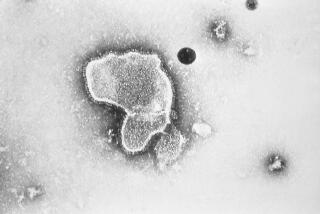Vaccine trial sparks breast cancer hopes
- Share via
A small trial of an experimental vaccine designed to activate the immune system against breast cancer suggests it may reduce the risk of death for most patients, U.S. military researchers said Sunday.
The vaccine, designed to treat women with tumors that generate a protein called HER-2, has been licensed to privately held Scottsdale, Ariz.-based Apthera Inc. under the brand name NeuVax.
If the results of the 163-patient study are validated in a larger trial, the vaccine may offer a new therapy for the largest subset of breast cancer patients, said Dr. Linda Benavides, a resident in general surgery at Brooke Army Medical Center in San Antonio and the study’s lead researcher.
About 25% to 30% of women with breast cancer have tumors that express high levels of HER-2. Their tumors tend to grow faster and are more likely to recur than tumors that do not carry the protein.
Most of these women are treated with Herceptin, also known as trastuzumab, an expensive antibody-based drug made by Genentech Inc.
Researchers at Brooke tested NeuVax in women whose tumors generated low levels of HER-2 as well as women with high levels of the protein.
At the 30-month follow-up, the injected vaccine was shown to have cut the risk of death for all patients by half, and in the group of patients with low-expressing HER-2 tumors, no deaths were reported.
Because of the small size of the study, the survival results were not statistically significant.
The study, presented in San Diego at a meeting of the American Assn. for Cancer Research, also showed that cancer recurred in 10.7% of vaccinated low expressers, compared with 18.2% of the control group.
Benavides said a planned Phase III trial of NeuVax in more than 700 patients would test the vaccine solely in women with tumors that generate low levels of HER-2 -- a group for whom immune-targeting therapy is currently unavailable.
But these breast cancer patients already have a better prognosis than women with high levels of the protein, leading to questions about whether the results can be duplicated in a larger trial.
“The surprising result is that it was the low-expressing patients who had the better outcomes. . . . That makes it difficult to interpret the data,” said Dr. William Hait, president of the American Assn. for Cancer Research and head of oncology research at Johnson & Johnson’s Ortho Biotech unit.
Benavides said the experimental vaccine offered a “very simplistic approach” toward targeting HER-2, adding that it would be “very cheap to mass produce.”
The wholesale price of Herceptin, which had U.S. sales of $1.3 billion last year, is about $40,000 a year.





